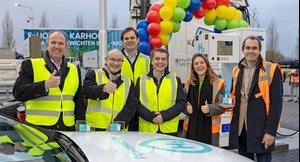News
TotalEnergies inaugurates H2 refueling stations in Rotterdam and Utrecht
TotalEnergies inaugurated a new public H2 refueling stations in the Rotterdam region, in Capelle aan den IJssel, and in Utrecht, the Netherlands, in the presence of Robert Joore, Managing Director of TotalEnergies Marketing Nederland; Antoine Tournand, Vice President H2, Florentin de Loppinot, Project Lead H2, of TotalEnergies Marketing & Services; and Adwin Martens, Chief Strategy Officer from WaterstofNet. Also present at the ceremony in Utrecht was Eva Oosters, Alderman for Emission-free Transport of this municipality.
A H2 corridor through the Netherlands – Belgium – Luxembourg – Germany. The realization of these H2 stations by TotalEnergies unlocks the strategic Trans-European Transport Network (TEN-T) corridor. The first route runs from Rotterdam towards Germany via the A12, allowing trucks, but also passenger and commercial light vehicles to refuel with H2 in Rotterdam (Capelle), Utrecht and TotalEnergies' already existing H2 station in Arnhem. The second route runs from Rotterdam to Breda towards Belgium via the A16. In addition, TotalEnergies recently opened another H2 station in Bettembourg, Luxembourg.
In Rotterdam (Capelle), the new refueling point for H2 with a pressure of 350 bar and 700 bar is located at the TotalEnergies Alexandrium multi-energy service station on Capelseweg 399/S109 at exit 16 of the A20/E25 motorway. In addition to H2 and conventional fuels, four 175 kW High Power Charging (HPC) points for electric vehicles (EV) are available at this station.
In Utrecht, the new station for H2 at 350 bar and 700 bar is located at De Heldinnenlaan 2 right next to The Wall shopping center and the A2. TotalEnergies also plans to install four HPCs for electric vehicles (EV) at this location.
The new H2 refueling stations in Rotterdam (Capelle) and Utrecht have been made possible by financial support from the European Union and the Dutch government. Both stations are part of the European H2Benelux project, coordinated by WaterstofNet and co-financed by the European Commission as part of the Connecting Europe Facility (CEF) program. This program (implemented by CINEA1) aims to significantly expand the existing public H2 refueling infrastructure and increase the number of H2-powered vehicles in the Benelux. A financial incentive contribution from the DKTI2 scheme, through which the Dutch government supports projects in sustainable mobility, including the construction of H2 refueling stations, was also used.
Robert Joore, Managing Director van TotalEnergies Marketing Nederland said, "The inauguration of the H2 refueling stations in Rotterdam/Capelle aan den IJssel, and Utrecht within the H2Benelux project is in line with TotalEnergies' ambition to achieve carbon neutrality by 2050, together with society. This brings the number of TotalEnergies' H2 stations in the Netherlands to seven, in addition to Arnhem, Delfzijl, Breda, Veldhoven and Roosendaal and confirms our position as one of the pioneers in the Netherlands in the roll-out of a national H2 network."
Antoine Tournand, Vice President H2 at TotalEnergies Marketing & Services said, "These new stations in Rotterdam and Utrecht will open up an important H2 corridor between the Netherlands and Germany. These stations represent a central link in the network of more than 100 H2 stations for heavy vehicles that we plan to build together with Air Liquide on key European crossroad corridors and which will contribute to decarbonizing freight transport in Europe."
Bert De Colvenaer, CEO of WaterstofNet said, “New milestones are reached on the road to sustainable mobility with the opening of these two strategically located H2 filling stations on the Ten-T corridor to Germany. This is also the objective of the European project H2Benelux, in which 8 filling stations in the Benelux connect to the surrounding countries. As CEO of WaterstofNet - coordinator of H2Benelux - I am proud of the result of our dedicated team and the cooperation with TotalEnergies. These filling stations are not only a physical extension of the H2 infrastructure, but also represent a commitment to a cleaner future for mobility. Working together, we have created a sustainable pathway that not only crosses borders, but also paves the way for a greener and more connected mobility experience.”
Richard Ferrer, Head of the Alternative Fuels Sector at CINEA said, “Sustainable Mobility is key to reach Green Deal objectives. The two H2 refueling stations which are being opened in Capelle aan den Ijssel and Utrecht are part of the H2Benelux project benefitting from a European Union financial support. They are located on strategic locations along major transport axis and near large urban areas such as Rotterdam and Utrecht. This will provide for low-emissions long distance travels and already represents a tangible contribution to building a H2 supply network for a decarbonized European transport system.”
Eva Oosters, Alderman for Emission-Free Transport at the Municipality of Utrecht said, “Utrecht is growing at a rapid pace. That brings us quite a few challenges, like how do we keep our city accessible and livable? That is why we prioritize clean mobility and are happy with the opening of the first H2 station in our city.


